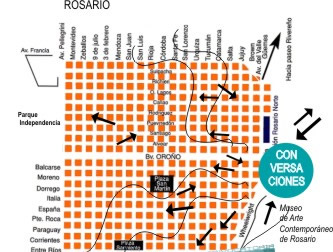EXHIBITIONS / PROJECTS

CONVERSATIONS
Installation, mise-en-scène, video, public actions,
printed pieces and documents.
2005
MACRO - Contemporary Art Museum of Rosario
Exhibition
Solo show:
Episode one of Alice Ville project
Conversations shows the process of building a collection
in real time. It addresses questions such as: What is
valuable and why, what is the process by which an object
can transform its status....
+
information
|
|
Description:
On the first floor of the museum, tone can see a sort of progressive
installation composed of daily objects.
NECESARY IMPLICATED ACTORS (NIA):
Museum team (Curation, Conservation and Communication Deparments).
Objects lent by: Ricardo Samuel - Cecilia Rosenfeld - Johana
Escalada – Julia Villanueva – Eugenia Calvo -
Gabriela Baldomá – Julían Basualdo –
Soledad Franco – Marcela Ciampini – María
Luján Pérez – Judi Salomón –
Alejandra Merello – Lili Prado – Leandro Comba
– Emiliano Pereyra – Carlos Herrera – Graciela
Pichard – Mauro Guzmán – María Georgina
Ricci – Daniel Oberti – José Pfafen –
Román Vitali – Verónica Pietro –
Fabiana Imola – Antonella Gentile – Carlos Mancilla
– María Rosa Fantini – Marcela Romer –
Sara Lenvenson – Leo Battistelli – María
Paola Rosso Ponce – Ricardo Leven – Gregorio Cosme
– Nancy Rojas – Bartolini Lucía and others.
MISE-EN SCENE
The standard structure of the museum is put into conversation
with community members of Rosario city – called mainly
by means flyers*, who lent daily objects over the course of
the show.
The Museum team and the object providers are an essential
part of this performance, and they are called necessary implicated
actors (NIA).
During the opening the museum room changes. For the first
few minutes there are only empty white displays and lighting.
Later, objects are received with a protocol document from
the museum’s Conservation Department, and then they
are placed under their exhibitions standards.
Those objects that have a more or less fixed meaning begin
to drift, as do the actors’ roles: this is true both
for the Conservation Department/team trained to operate with
"artworks", and for the "providers" whose
objects are treated by the Museum with the documentary protocol
and the status of "artwork", as well as for the
role of “authorship”.
The flyers were designed by the museum’s Communication
Department.
|
Flyer (designed by the museum’s Communication
Department)
|
 |
| Protocol
document from the museum |
|